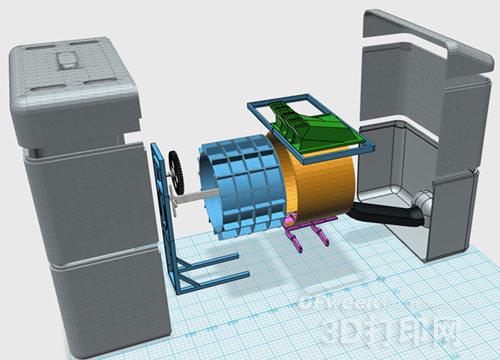Some time ago, OFweek 3D Printing Network reported on the upcoming 3D printing tablets and a custom-dose 3D tablet printer. This highlights how 3D printing is making a lasting impact in the biomedical field.
A user named "Joe" on Hackaday, a popular DIY platform, is based in Boston, Massachusetts. He holds a Ph.D. in electrical engineering from Oregon State University. Recently, he created a device controlled by a Raspberry Pi using 3D printing technology, which he calls a “drug vending machine.†The system helps medical staff or family members manage and organize medication for patients more efficiently.

If you've ever cared for someone with chronic conditions, you know that taking the right dose at the right time is crucial. There are already pill organizers on the market, but they’re most useful for people who take medication once a day. For those needing multiple doses, these tools often fall short.
Joe’s Smart Desktop Medicine Organizer automatically sorts pills according to prescriptions, storing each dose separately and allowing access through an automated system.

This device not only helps manage medications accurately and efficiently, but it also features built-in WiFi and cloud connectivity. As Joe explains, this allows drug inventory and usage data to be sent directly to doctors and pharmacies, enabling caregivers to monitor patient medication use remotely.
Additionally, the machine includes a feature called “smart drug control.†Connected to the cloud, it can check if drugs are safe to take together and alert users if there's a risk of improper medication. It can also limit how often a drug is dispensed to prevent overdosing.
“This project,†Joe says, “is my solution to medication non-compliance.†He explains that inappropriate medication includes forgetting to take a dose, taking too much, or mixing drugs that shouldn’t be taken together.
Improper medication is a major issue in the U.S., costing around $300 billion annually. In fact, 30% of early deaths among the elderly are linked to medication errors. One common problem is forgetting to take a dose. The Smart Desktop Pill Organizer not only reminds patients when to take their medication, but also supports more complex, dynamic schedules—like intermittent pain relief—while ensuring patients don’t overdose.

Joe uses a web server running on the Raspberry Pi to control the machine. “It provides a web page that can be displayed on a PiTFT resistive touch LCD screen, serving as the user interface,†he explains. The web interface can send CGI commands to control the servos and read encoder data. Additionally, the Raspberry Pi has a Wi-Fi adapter, allowing smartphones to connect and manage the machine remotely.
Joe also designed the system to store all medication plans and drug inventory information in a local SQLite database.
Like many makers, Joe has shared detailed programming instructions, software libraries, and a list of components, consumables, and 3D-printed parts needed for the project on his Hackaday blog. His project log offers a great resource for anyone interested in building their own smart pill organizer.

Side Tables
end tables,end tables for living room,small side table,marble side table,side table with wheels,corner table for living room,small end tables
Auxford furniture , https://www.auxfurniture.com